|
|
|
Sort Order |
|
|
|
Items / Page
|
|
|
|
|
|
|
| Srl | Item |
| 1 |
ID:
099510
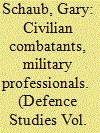

|
|
|
|
|
| Publication |
2010.
|
| Summary/Abstract |
States have increasingly replaced military personnel with armed civilian contractors. Are these civilians members of the military profession? I address this question in two ways. First, I assess whether armed contractors exhibit the characteristics of the profession of arms: expertise in the application and management of violence, provision of cost-effective solutions within the jurisdiction of warfare, legitimacy derived from the state and polity, and a recognized corporate identity. Then I assess the views of 260 elite American field grade officers. I find that armed contractors do share many of the characteristics of military professionals but that officers do not view the civilian contractors as military professionals, are uncomfortable with their intrusion into the profession of arms, and are cognizant of their negative effects but some ambivalence in their responses suggests that the boundaries of the profession of arms are being permeated by civilian contractors acting in combat roles.
|
|
|
|
|
|
|
|
|
|
|
|
|
|
|
|
| 2 |
ID:
101056
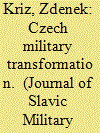

|
|
|
|
|
| Publication |
2010.
|
| Summary/Abstract |
The new security challenges began to be emphasized in Czech strategic documents as early as the beginning of the 1990s. As a result, the Czech Army has been undergoing its radial and essentially continuous transformation since the beginning of its existence in 1993. The elimination of these threats became an important task for the Czech military. In contrast with the situation in the other armies of consolidated democracies, the ideal of the military professional has not changed much in the Czech Republic. It still is a combination of a warrior, technician, and manager. In 1989-92, there were some processes taking place in Czechoslovakia in the area of civil-military relations that, in many respects, differed from the development in Western Europe. The most important of these was the process of the de-politicization of the army in the sense of freeing it from Communist Party influence and control.
|
|
|
|
|
|
|
|
|
|
|
|
|
|
|
|
| 3 |
ID:
161546
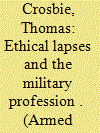

|
|
|
|
|
| Summary/Abstract |
In a recent issue of this journal, we published an article titled “Fault Lines of the American Military Profession”. Donald S. Travis subsequently wrote a Dipustatio Sine Fine rejoinder that raised a number of criticisms of our piece and suggested several ways forward. For our part, we detect three serious problems in Travis’s analysis and offer a single syncretic response. Our solution builds on the insights of Travis’s critique while avoiding the pitfalls of his specific line of reasoning. We conclude by urging others to continue to debate and research these very consequential and timely issues.
|
|
|
|
|
|
|
|
|
|
|
|
|
|
|
|
| 4 |
ID:
160628
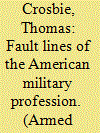

|
|
|
|
|
| Summary/Abstract |
Over the past decade, the American armed services have witnessed a near-constant stream of so-called ethical lapses. Spanning rank, specialty, and service, these “lapses” have given rise to a flood of criticism by journalists and piercing calls for reform from politicians. In response, American military leaders have pointed to the paired concepts of profession and professionalism as the solution. In this article, we use classical conceptualizations of the military profession to resituate the problem of ethical lapses as instead one of the three fault lines of the contemporary American military profession, unfolding alongside crises in military expertise and identity. The three fault lines reveal at once the large scale of the challenges facing the American armed services and our very limited social scientific understanding of those problems. We end by emphasizing the need for future research to establish an updated empirical baseline for theories of the military profession in America.
|
|
|
|
|
|
|
|
|
|
|
|
|
|
|
|
| 5 |
ID:
108712
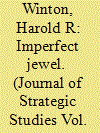

|
|
|
|
|
| Publication |
2011.
|
| Summary/Abstract |
This article explores a perennial theme in the literature of strategic studies: the relationship between military theory and the military profession. It begins with a conceptual analysis of this relationship. It then investigates what military theorists themselves have had to say about the utility of their craft. It concludes by assessing the actual influence of military theory on selected individuals and institutions. The individuals are George S. Patton, Jr., and Ulysses S. Grant. The institutions are the United States Army and the United States Air Force in the late twentieth century. The fundamental finding is suggested in the title: military theory can indeed be quite useful in the maturation of military commanders and in the development of martial institutions, but it is not always necessary and by no means perfect. It should thus be studied assiduously but used with caution.
|
|
|
|
|
|
|
|
|
|
|
|
|
|
|
|
| 6 |
ID:
165363
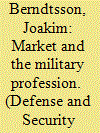

|
|
|
|
|
| Summary/Abstract |
The rise of private military and security companies (PMSCs) challenges our notion of military professionals. PMSCs bring new claims to professional status and legitimacy outside military institutions and represent an increasing diffusion of - and competition over - military and security expertise. In light of this development, understanding the formation of professional identities in military and private security organisations is as an important undertaking. This paper contributes to this endeavour by analysing professional self-images in the Swedish Armed Forces and how these relate to PMSCs. The study is based on data collected from official documents, semi-structured interviews and a small-scale survey among senior military officers. Focusing on military understandings of PMSCs and contractors, the analysis provides much-needed insight into relational aspects of professional identity formation outside the US context. Furthermore, it points to discrepancies in organisational and group levels in understandings of commercial security actors, and paves the way for future research.
|
|
|
|
|
|
|
|
|
|
|
|
|
|
|
|
| 7 |
ID:
112374
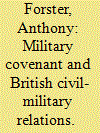

|
|
|
|
|
| Publication |
2012.
|
| Summary/Abstract |
This article reviews debates surrounding the Military Covenant and explores its salience for contemporary British civil-military relations. It explores why the concept of the Military Covenant was created, the nature of subsequent debates, and finally it reflects on the wider implications of this research. Locating the Covenant in debates concerned with the changing nature of the military profession, this article argues that the Covenant was created in 2000 as a response to a challenge to the Army's right to be different and thus its jurisdiction. However, tensions caused by new missions in Iraq and Afghanistan subsequently transformed the Covenant's use and meaning. Senior commanders extended the use of the Covenant to establish the boundaries of their expertise and legitimacy, whilst external actors with a variety of competing interests used the Covenant to contest "authoritative discretion" of the military within a clearly delineated professional space.
|
|
|
|
|
|
|
|
|
|
|
|
|
|
|
|
| 8 |
ID:
175453
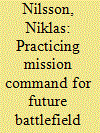

|
|
|
|
|
| Summary/Abstract |
As armies across Europe are currently developing capabilities to fight a high-intensity conventional war against a peer adversary, these armies will have to develop units that can fight independently in a complex environment, with limited direction from higher levels of command. Integral to this process is the need for a competent practice of mission command, viewed as a key component of maneuver warfare. The article identifies a set of enablers that need to be present in a military organization in order to practice mission command efficiently, including shared understanding and trust; initiative; a tolerant approach to failure, success, and learning; and the acceptance of mission command as an all-encompassing practice. The article then presents data from interviews with Swedish army officers focusing on the presence and significance of these enablers in their professional context. The article concludes that the increasing complexity of the peacetime tasks performed by military officers give rise to conflicting leadership demands. Consequently, exercising mission command and socializing younger colleagues into the practice is a far from straightforward process, which frequently competes with other demands placed on officers by their colleagues, the organization that they are part of, or the broader societal context.
|
|
|
|
|
|
|
|
|
|
|
|
|
|
|
|
| 9 |
ID:
109419
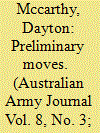

|
|
|
| 10 |
ID:
128707


|
|
|
| 11 |
ID:
121912
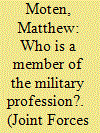

|
|
|
| 12 |
ID:
163576
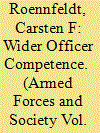

|
|
|
|
|
| Summary/Abstract |
Identifying and developing officer competence is important to a nation’s security and a crucial attribute of a legitimate military establishment. Critics have claimed that the U.S. officer corps favors a narrow conception of expertise that limits the armed forces’ utility as an instrument of policy. Drawing from the dialogue between Huntington and Janowitz, as well as Aristotle’s notion of practical wisdom, this article proposes a wider understanding of officer competence consisting of four distinct conceptual categories. The U.S. defense establishment favors “military skill” over other categories of competence. As a result, the officer corps is poorly prepared for 21st-century warfare. To remedy this situation, professional military education should cultivate military leaders that, in addition to military skill, have sociopolitical competence and practical wisdom. In this context, this article suggests strategies to develop such competencies that officers need to be able to achieve a diversity of national political goals.
|
|
|
|
|
|
|
|
|
|
|
|
|
|
|
|
|
|
|
|
|